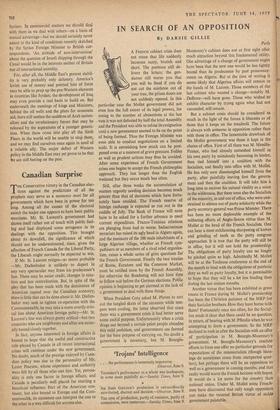IN SEARCH OF AN OPPOSITION
By DARSIE GILLIE A FRENCH cabinet crisis does not mean that life suddenly becomes nasty, brutish and short. The postman still de- livers the letters; the gen- darme still warns you that you will be fined if you do not cut the mistletoe out of your tree; the prison doors are not suddenly opened. In this particular case the Mollet government did not even lose the full extent of its legal powers, for owing to the number of abstentions at the last vote it was not defeated by half the total Assembly and the President was able to refuse its resignation until a new government seemed to be on the point of being formed. Thus the Foreign Minister was even able to conduct negotiations on a limited scale. It is astonishing how much can be post- poned even at a moment of grave pressure. Follies as well as prudent actions may thus be avoided. After some experience of French Government crises one begins to accept the French philosophic approach. They last longer than the English weekend but they occur much less often.
Still, after three weeks the accumulation of matters urgently needing decision becomes much greater than that of decisions which have fortu- nately been avoided. The French reserve of foreign exchange is expected to run out in the middle of July. The Bank of France will soon have to be asked for a further advance to meet current expenditure. Franco-Tunisian relations are plunging from bad to worse. Indiscriminate terrorism has raised its ugly head in Algiers again, and the massacre of the 300 male inhabitants of a large Algerian village, whether as French sym- pathisers or as members of a rival rebel organisa- tion, raises a whole series of grim questions for the French Government. Finally the two treaties of Rome, Euratom and the Common Market, must be ratified soon by the French Assembly, for otherwise the Bundestag will not have time to follow suit before the German elections. Public opinion is beginning to get alarmed at the lack of a government to deal with these things.
When President Coty asked M. Pleven to sort out the tangled skein of the situation while tem- pers were cooling, the latter observed that since there was a government crisis it had better serve some useful purpose. Unfortunately when a crisis drags out beyond a certain point people abandon this mild ambition, and governments are formed for the bare purpose of carrying on. No doubt a government is necessary, but M. Bourges- Paris Maunoury's cabinet does not at first sight offer much attraction beyond this fundamental utility.
One advantage of a change of government might have been that the new one would be less tightly bound than its predecessor by past pronounce- ments on Algeria. But at the time of writing it seems likely that Algerian affairs will remain in the hands of M. Lacoste. Those members of the last cabinet who wanted a change—notably M. - Defferre—will have gone. Those who wished to exhibit character by trying again what had not succeeded, will remain.
But a cabinet crisis should be considered as much in the light of the forces it liberates as of those that it keeps on the treadmill. The future is always with someone in opposition rather than with those in office. The lamentable drawback of the Mollet government was those it kept in the chains of office. First of all there was M. Mendes- France, who had already enmeshed himself in his own party by mistakenly becoming its leader, then tied himself into a coalition with the Socialists, and finally into office with M. Mallet. He has only now disentangled himself from the party, after painfully leaving first the govern- ment and then the coalition. It will take him a long time to recover his natural vitality as a voice in the wilderness. But there were also the Socialists of the minority, in and out of office, who were con- strained to silence out of party solidarity while the party secretary-general was Prime Minister. There has been no more deplorable example of the withering effects of Anglo-Saxon virtue than M. Mollet at the head of the French Socialists. One can hear a most exhilarating sharpening of knives and grinding of teeth as the party congress approaches. It is true that the party will still be in office, but it will not hold the premiership. The obligations of party loyalty can no longer be pitched quite so high. Admittedly M. Mollet will be at the Toulouse conference at the end of the month to bind with the obligations of patriotic duty as well as party loyalty, but it is permissible to hope that they will be a lot less binding than during the last sixteen months.
Another virtue that has been exhibited to gross excess in France during M. Mollet's premiership has been the Christian patience of the IVIRP for their Socialist brothers. How they have borne with them! Fortunately once too often, for the Social- ists made it clear that there could be no question, in return, of bearing with M. Pflimlin when he was attempting to form a government. So the MRP declined to rush in after the Socialists with an offer of participation in M. Bourges-Maunoury's government. M. Bourges-Matinoury's resolute efforts to form one offer no particular grounds for expectations of the ministerialists (though bless- ings do sometimes come from unexpected quar- ters), but perhaps there will be an opposition as well as a government in coming months, and that really would warm the French horizon with hopes. It would do a lot more for the country than national union. Under M. Mollet some French- men have discovered that only tough opposition can make the vaunted British virtue of stabl* government palatable.


































 Previous page
Previous page